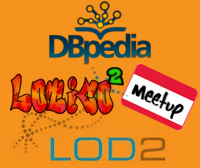
Session, FRI 13:30 - 15:00
Towards Question Answering on Statistical Linked Data
As an increasing amount of statistical data is published as linked data, intuitive ways of satisfying information needs and getting new insights out of the data become more and more important.
Question answering systems provide such an intuitive interface by translating natural language queries into SPARQL, which is the native query language of RDF knowledge bases.
Statistical data, however, is structurally very different from other data and cannot be queried using existing approaches.
We analyze the particularities of statistical data represented in the RDF Data Cube Vocabulary in relation to question answering and sketch a new question answering algorithm on statistical data.
In order to estimate typical user questions, a statistical question corpus is compiled and its elements are categorized.
Konrad Höffner, Jens Lehmann
University of Leipzig, Germany
Open ITA-int.org registry of automotive terminologies
On 14 March 2000 ITA was founded with the goal of improving the flow of information between car manufacturers and suppliers on the one and the ICT companies on the other hand. The current focus is on the support along the entire automotive value chain.
Today, more than 50 well-known service providers are organized with different core competencies in the ITA. They know the business processes in the automotive industry in detail and successfully support national and international operations. The Automotive Industry will benefit in addition to the industry-specific expertise and experience in the local markets of excellent IT skills and innovations that enable advanced and efficient processes.
Based on this background ITA has developed vertical competency working groups who all have come up with one single common requirement: The creation of a shared data vocabulary for their industry with the goal of increasing the free flow of information between heterogenous networks of systems and industry partners.
With open. ITA-INT.org ITA is now establishing a central repository which is designed to foster the creation of open vocabulary projects within the automotive industry.
Already multiple different projects have been incubated including:
- MOBIVOC
- OPEN SHOPFLOOR PROTOCOL
- SCOR – Supply Chain Benchmark Vocabulary
- E12 – Supply Chain Master Data Vocabulary
In many ways ITA will organize itself along the lines of the Eclipse Foundation, which has a long standing track record in collaborative creation of IP and providing intellectual property to industry in a way which is well aligned with the requirements of those entities creating and consuming the content.
Open.ITA-INT.org works under the motto: “collaborate on standards, compete on implementation” and thus here again follows in the footsteps of the Eclipse Foundation, who has made software creation with Java tools so much more effective and efficient and who has successfully standardized its industry with more than 80% of global java developers using Eclipse base development tools.
Sören Auer
Prof. Sören Auer holds the chair for Enterprise Information Systems at University of Bonn, leads a research group at Fraunhofer Institute for Analysis and Information Systems (IAIS) and is scientific advisor of eccenca GmbH. Sören has made substantial contributions to social and semantic web technologies, knowledge engineering, usability, as well as databases and information systems. Sören is author of over 80 peer-reviewed scientific publications. Sören is leading the European Union’s FP7-ICT flagship project LOD2 comprising 15 partners from 11 countries. He is co-founder of several high-impact research and community projects such as DBpedia, SlideWiki.org, LinkedGeoData and OntoWiki. organiser and co-programme chair of renowned scientific conferences, area editor of the Semantic Web Journal, serves as an expert for industry, EC, W3C and advisory board member of the Open Knowledge Foundation.
POSTER:
Efficient Search and Browsing of CSV Datasets
The paper presents an application developed within the FP7 LOD2 project that supports effcient search and browsing of CSV files. The application indexes CSV files using DBpedia categories and sophisticated strategies for identification of the best descriptors. The paper introduces the application as well as presents its usage scenario. To the best of our knowledge no similar solution exists.
Agata Filipowska, Krzysztof Węcel and Dominik Filipiak
Department of Information Systems, Poznan University of Economics, Poland
POSTER:
Text Insights: Natural Language Analytics for Understanding Social Media Engagement
We present Text Insights, an application for understanding factors of user engagement in Facebook pages. Providing analytics based on natural language processing, Text Insights is complementary to existing tools offering mainly numerical indicators of user engagement. Our system extracts keyphrases from page content in a linguistically motivated manner. Keyphrases are weighted according to their relevance as approximations of the most important topics in the community. We demonstrate that the system provides valuable insights for page owners interested in trend discovery, content evaluation and content planning.
Frank Grimm, Matthias Hartung and Philipp Cimiano
Bielefeld University, CITEC, Semantic Computing Group















